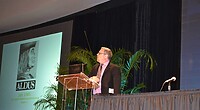
This morning’s IDPF event in New York’s Javits Center began with a wide-open presentation from The Domino Project’s Seth Godin entitled, “The Attention Economy.” According to Godin, books are facing a hugely limiting enemy: shelf space. Traditional print publishing has to accumulate content and repackage it for the all-important marketing and placing in bookstores and libraries, designing it to compete with every other book out there.
With ebooks sold through digital retailers, there is no such thing as shelf space. There is an infinite amount of space out there to accommodate and infinite amount of books. While books do still have to maintain a searchability and fight for readers’ attention, the issue of physically fitting a book into a store is eliminated.
Godin explained that there are countless strategies to make a digital book more viable in terms of searching and purchasing. With twelve very different bestselling titles coming out of the Domino Project experiment, all of them bringing unique elements to a book experience, Godin declared the experiment a huge success while still declaring that he is a publishing paradigm changer, not a publisher.
Interestingly, once the discussion was open to audience questions, the first was from a publisher who wanted to know why so much emphasis is placed on the selling of books and less importance is attributed to discovering how much of the book actually gets read. Godin’s response indicated that Amazon has the capability to view how much of an ebook was opened and viewed, so it may be only a matter of time before we begin to change the perception of a book’s success based on readership, not sales.
The IDPF Digital Book 2012 is put on by the International Digital Publishing Forum, “the global trade and standards organization dedicated to the development and promotion of electronic publishing and content consumption.”
Mercy Pilkington is a Senior Editor for Good e-Reader. She is also the CEO and founder of a hybrid publishing and consulting company.
